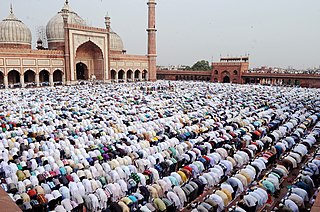
Back Religionsfreiheit ALS حرية الاعتقاد Arabic حرية العقيده ARZ Llibertá de cultu AST دین اؤزگورلوگو AZB Свабода веравызнання Byelorussian Свобода на вероизповеданието Bulgarian ধর্মীয় স্বাধীনতা Bengali/Bangla ཆོས་དད་རང་མོས། Tibetan Sloboda vjere ili uvjerenja BS
| Freedom of religion |
|---|
| Religion portal |
| Part of a series on |
| Liberalism |
|---|
 |

Freedom of religion or religious liberty is a principle that supports the freedom of an individual or community, in public or private, to manifest religion or belief in teaching, practice, worship, and observance. It also includes the right not to profess any religion or belief[1] or "not to practise a religion" (often called freedom from religion).[2]
The concept of religious liberty includes, and some say requires, secular liberalism, and excludes authoritarian versions of secularism.[3][4][5]
Freedom of religion is considered by many people and most nations to be a fundamental human right.[6][7] Freedom of religion is protected in all the most important international human rights conventions, such as the United Nations International Covenant on Civil and Political Rights, the American Convention on Human Rights, the European Convention on Human Rights, and the United Nations Convention on the Rights of the Child. In a country with a state religion, freedom of religion is generally considered to mean that the government permits religious practices of other communities besides the state religion, and does not persecute believers in other faiths or those who have no faith; in other countries, freedom of religion includes the right to refuse to support, by taxes or otherwise, a state religion.
Freedom of religion includes and may go beyond freedom of belief (this freedom is usually limited to the right to believe whatever a person, group, or religion wishes). Rather, freedom of religion includes, freedom of practice, the right to practice the religion or belief openly and outwardly in a public manner, which some believe is a central facet of religious freedom.[8] A third term, freedom of worship is of uncertain definition and may be considered to fall between the two terms. The term "belief" is considered inclusive of all forms of irreligion, including atheism, humanism, existentialism or other schools of thought. Whether non-believers or humanists should be considered for the purposes of freedom of religion is a contested question in legal and constitutional contexts. Crucial in the consideration of this liberty is the question of whether religious practices and motivated actions which would otherwise violate secular law should be permitted due to the safeguarding freedom of religion, considered in e.g., (in American jurisprudence) Reynolds v. United States or Wisconsin v. Yoder, (in European law) S.A.S. v. France, and numerous other jurisdictions.
- ^ "CCPR General Comment No. 22: Article 18 (Freedom of Thought, Conscience or Religion)". 30 July 1993 – via https:refworld.org.
5. The Committee observes that the freedom to 'have or to adopt' a religion or belief necessarily entails the freedom to choose a religion or belief, including the right to replace one's current religion or belief with another or to adopt atheistic views. [...]
- ^ "CASE OF BUSCARINI AND OTHERS v. SAN MARINO". European Court of Human Rights. 18 February 1999. § 34. Retrieved 24 January 2023..
- ^ Andrew Koppelman, How could religious liberty be a human right?, International Journal of Constitutional Law, Volume 16, Issue 3, July 2018, Pages 985–1005, https://doi.org/10.1093/icon/moy071
- ^ "Is the liberal state secular? How much state-religion separation is necessary to secure liberal-democratic ideals". Religion and Global Society. 5 April 2017. Retrieved 7 March 2024.
- ^ Rosentiel, Tom (3 December 2007). "Religion and Secularism: The American Experience". Pew Research Center. Retrieved 7 March 2024.
- ^ Davis, Derek H. "The Evolution of Religious Liberty as a Universal Human Right". Archived from the original on 1 February 2008. Retrieved 5 December 2006.
- ^ Congress, U. S. (2008). Congressional Record #29734 – 19 November 2003. U.S. Government Printing Office. ISBN 978-0160799563. Retrieved 3 September 2011.
- ^ Cite error: The named reference
Farr2019was invoked but never defined (see the help page).
© MMXXIII Rich X Search. We shall prevail. All rights reserved. Rich X Search